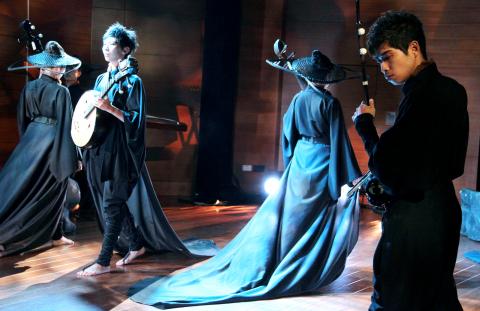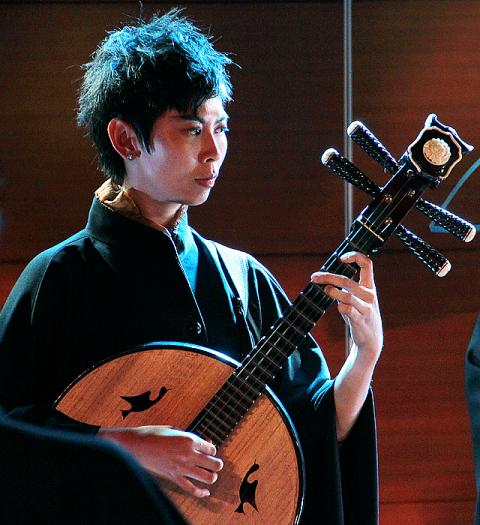Established in 1991 as a traditional Chinese ensemble, Chai Found Music Workshop (采風樂坊) has battled valiantly to broaden the appeal of traditional Chinese chamber music through the incorporation of modern musical styles and dramatic elements. This weekend, it presents Wuji (無極), the most recent composition by troupe founder and artistic director Huang Cheng-ming (黃正銘). This work, with its atmospheric stage setting and stylistic borrowings from the epics of martial arts and chivalry, aims to captivate a younger audience.
With Wuji, Huang has moved away from the overtly dramatic presentation of works such as 2005’s Ambush! — An Instrumental Musical (十面埋伏) and 2007’s The Journey of the Monkey King (西遊記), both of which were based on well-known stories. With Wuji, he has shifted toward something more abstract. This new work is a representation of the four seasons as felt by a nameless itinerant warrior. Why he is where he is and what led him there are all left up to the imagination of audience members, who can find their own interpretation of the tale as the changing moods of the seasons wash over them.
In this wider imaginative space, the musical instruments have greater scope for individual expression.

Photo courtesy of Chai Found Music Workshop
“For example, the deep, resonant sound of the ruan (阮) underscores a darker side to the protagonist’s character, which is juxtaposed against the strong, vibrant notes of the erhu (二胡) [the protagonist’s main instrument],” Huang said. “The two sides, darkness and light, struggle against each other.”
This abstract musical struggle is set against a visual backdrop inspired by martial arts epics and fantasy tales, with the costumed musicians also serving as performers and dancers. Huang achieved remarkable results in The Journey of the Monkey King, cajoling his young musicians to not only play their instruments, but also serve as characters in a story. In this more abstract work, the performers have an even more difficult task in being physically expressive without the aid of a narrative structure.
The use of backing music, notably some percussion, gives the production a driving energy, but from sections reviewed during a pre-debut lecture/performance last month, its effectiveness is questionable, for while it makes the music accessible, it also diminishes its rigor and character. It is clear that Huang is striving for a contemporary feel to this piece, and these efforts are laudable, but with Wuji one cannot get away from the feeling that the group is trying a little too hard to be all things to all people.

Photo courtesy of Chai Found Music Workshop
The skill and versatility of the Chai Found Music Workshop has been proved repeatedly in collaborations with experimental musical groups including the French contemporary Ensemble 2e2m and the Dutch Nieuw Ensemble. The troupe also continues to uphold the traditional skills of the Chinese ensemble orchestra and is engaged in the training of a new generation of performers. The venture into musical theater, which began in 2005, has already proved exciting, and Wuji, the third production of this type, is another chance for Chai’s young performers to show off their virtuosity.
Wuji premiers at the National Theater in Taipei City today at 7:30pm, with performances tomorrow at 7:30pm and Sunday at 2:30pm. Tickets are NT$300 to NT$2,000. The production will also show in Hsinchu on Wednesday, with further performances in Jhongli and Taichung next month.

Towering high above Taiwan’s capital city at 508 meters, Taipei 101 dominates the skyline. The earthquake-proof skyscraper of steel and glass has captured the imagination of professional rock climber Alex Honnold for more than a decade. Tomorrow morning, he will climb it in his signature free solo style — without ropes or protective equipment. And Netflix will broadcast it — live. The event’s announcement has drawn both excitement and trepidation, as well as some concerns over the ethical implications of attempting such a high-risk endeavor on live broadcast. Many have questioned Honnold’s desire to continues his free-solo climbs now that he’s a

As Taiwan’s second most populous city, Taichung looms large in the electoral map. Taiwanese political commentators describe it — along with neighboring Changhua County — as Taiwan’s “swing states” (搖擺州), which is a curious direct borrowing from American election terminology. In the early post-Martial Law era, Taichung was referred to as a “desert of democracy” because while the Democratic Progressive Party (DPP) was winning elections in the north and south, Taichung remained staunchly loyal to the Chinese Nationalist Party (KMT). That changed over time, but in both Changhua and Taichung, the DPP still suffers from a “one-term curse,” with the

Jan. 26 to Feb. 1 Nearly 90 years after it was last recorded, the Basay language was taught in a classroom for the first time in September last year. Over the following three months, students learned its sounds along with the customs and folktales of the Ketagalan people, who once spoke it across northern Taiwan. Although each Ketagalan settlement had its own language, Basay functioned as a common trade language. By the late 19th century, it had largely fallen out of daily use as speakers shifted to Hoklo (commonly known as Taiwanese), surviving only in fragments remembered by the elderly. In

William Liu (劉家君) moved to Kaohsiung from Nantou to live with his boyfriend Reg Hong (洪嘉佑). “In Nantou, people do not support gay rights at all and never even talk about it. Living here made me optimistic and made me realize how much I can express myself,” Liu tells the Taipei Times. Hong and his friend Cony Hsieh (謝昀希) are both active in several LGBT groups and organizations in Kaohsiung. They were among the people behind the city’s 16th Pride event in November last year, which gathered over 35,000 people. Along with others, they clearly see Kaohsiung as the nexus of LGBT rights.